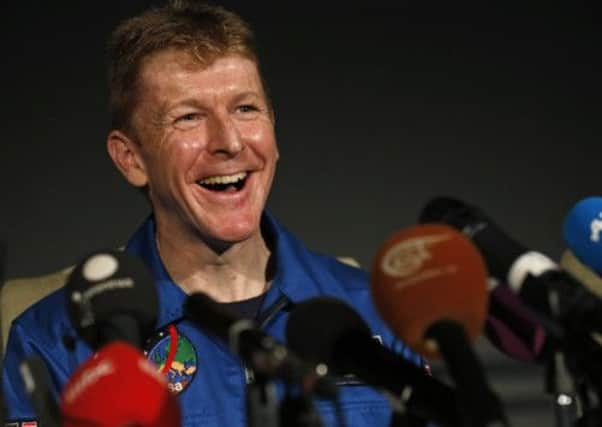British astronaut headed for Space Station


Major Tim Peake, 41, will be the first UK astronaut in space for more than 20 years.
One of six candidates selected from more than 8,000 hopefuls, he will live and work on the space station for six months, starting in November 2015.
Advertisement
Hide AdAdvertisement
Hide AdAsked at a news conference at the Science Museum in London if he was worried about dangers on the mission, he said: “No, I think my future career is probably far safer than my past career, I’ve carried out some fairly high risk flight tests. It’s not an unfamiliar environment to be working in, I’m not overly apprehensive about that.”
Maj Peake will carry out a science programme and take part in a European education initiative before and during his mission.
Prime Minister David Cameron said: “This is a momentous day, not just for Tim Peake but for Great Britain. It is a great sign of our thriving British space sector, which has seen real growth thanks to our world-class research, and now supports nearly 30,000 jobs.
“What an achievement that Tim was picked for this historic role from over 8,000 applicants from around the world. I am sure he will do us proud and I hope that he will inspire the next generation to pursue exciting careers in science and engineering.”
Maj Peake, who was instrumental in introducing Apache helicopters into service with the British Army, after flying them in the United States, said: “It really is a true privilege to be assigned to a long duration mission, it feels like a real high point in a long career in aviation.
“I am really grateful to my family, friends and professional colleagues who are supporting me as I prepare for the challenge that lies ahead.
“The mission to the International Space Station is going to be a wonderful opportunity, not just for Europe and European science but the UK as well.”
In a jokey reference to David Bowie fan, Commander Chris Hadfield, he said: “I do play the guitar, but very badly, and I wouldn’t inflict my singing on anybody.”
Advertisement
Hide AdAdvertisement
Hide AdCdr Hadfield, from Canada, was his country’s first professional astronaut, and gained a legion of fans on the Soyuz space capsule mission to and from the ISS, by performing a cover of the Bowie classic, Space Oddity. He now has close to one million followers on Twitter.
Maj Peake praised Cdr Hadfield for the “fantastic job” he had done. “I don’t think I’ll be able to top the tweeting, but I will also be tweeting, to encourage a generation to take an interest in space.”
He said it was too early to say what experiments he would be involved in, but there were “rolling experiments” in different fields on the space station which he expected to continue.
These were in fields such as human physiology, medical research into vaccines, fluids physics and astrobiology.
It was too early to say whether there would be an opportunity for him to do a spacewalk during his tour.
Lift off to the space station would be from Kazakhstan in a Soyuz rocket.
Profile: Pilot spent 12 days at underwater test base
THE MAN who will be the first UK astronaut in space for more than 20 years graduated from Sandhurst in 1992 as an officer in the Army Air Corps.
Major Tim Peake, 41 served in Northern Ireland before beginning flying training, being awarded his wings in 1994.
Advertisement
Hide AdAdvertisement
Hide AdBetween 1994 and 1998 he served as a reconnaissance pilot and flight commander in Germany, the former Yugoslavia, Northern Ireland, Kenya and Canada.
He qualified as a helicopter flying instructor in 1998 and was selected for an exchange posting with the US army, flying Apache helicopters at Fort Hood, Texas.
On his return to the UK, he played a key role in introducing the Apache into service with the British Army.
He was selected as a European Space Agency astronaut in May 2009 and completed basic training in November 2010. He has certification which allows him to be responsible for the communication between the astronauts in orbit and the ground during spaceflights.
In June last year, he spent 12 days in an underwater base for Nasa, which allows space agencies to test technologies and research international crew behaviour for long-duration missions.
He enjoys skiing, diving and, cross-country running.